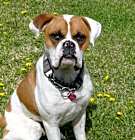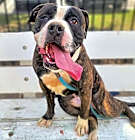Color
Tan/Yellow/Fawn - with White
Size
(when grown) Large 61-100 lbs (28-45 kg)
Details
Good with kids
Good with dogs
Not good with cats
Spayed or Neutered
Shots are up-to-date
Story
Meet Jax!
A nearly seven-year-old Boxer mix from San Mateo, CA, whose tan coat shines almost as brightly as his personality! Weighing in at a solid 70 pounds, Jax might just think he's a lap dog with his affectionate, sloppy kisses and an unwavering desire to be close to his humans. Imagine this gentle giant curled at your feet, or better yet, joining in a lively game of keep-away with gleeful children. His joy is palpable, especially when he performs his signature "jumping jax" at the mere mention of a walk!
Jax has a heart full of resilience and love, ready to bring warmth to any family. Though he prefers not to be left alone for long, he’s a perfect companion when around other dogs he knows or people—even if just in another room.
He adores the great outdoors, and his enthusiasm shines during playdates and adventures at the local dog park. He’s sociable with dogs of all sizes, though his recall may need a little polish—Jax is ever curious about the wildlife he encounters!
Living with Jax means embracing his high-energy spirit and managing his sensitive stomach with the right diet. An enclosed yard, constant companionship, and a routine filled with walks and playtime would ensure his days are as joyful as he is.
Does your home have room for a big-hearted boxer mix with a love for life? Could you be the one to keep Jax's tail wagging happily ever after? If so, please contact us at adopt@joyfulpets.com, and let's chat about the joy Jax can bring into your life!
Also, Jax is open to a long-distance adoption—love knows no distance when finding your perfect companion!


















